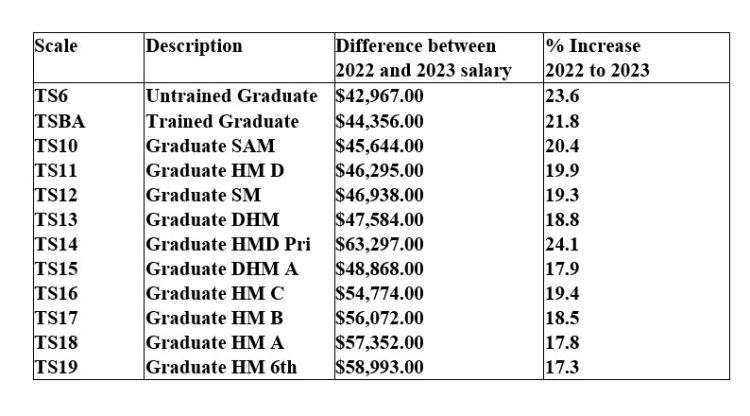Dear Editor,
 The Minister of Education, Priya Manickchand, launched a trenchant critique against the GTU for issuing an ultimatum to resume strike action on May 16, 2024, and therefore halt the conciliation process provided for in the 1990 Avoidance and Settlement of Disputes Agreement. “My conclusion could only be that they intended to derail this process. They do not intend to have a conciliation. They want to keep teachers on the road. They want to be disruptive to the education system. And we believe that is … politically, directed because no one who has the interest of children at heart could tell me that this is a good place to be in.”
The Minister of Education, Priya Manickchand, launched a trenchant critique against the GTU for issuing an ultimatum to resume strike action on May 16, 2024, and therefore halt the conciliation process provided for in the 1990 Avoidance and Settlement of Disputes Agreement. “My conclusion could only be that they intended to derail this process. They do not intend to have a conciliation. They want to keep teachers on the road. They want to be disruptive to the education system. And we believe that is … politically, directed because no one who has the interest of children at heart could tell me that this is a good place to be in.”
Manickchand emphasized that the request [for an interim payment of 20% across the board to teachers before conciliation proceeds] by the Union was not only unreasonable but that the Government “would not sign off on the Union’s request and would also not negotiate under duress.” The education minister further contends that GTU was setting a “very bad precedent not only for the Guyana Government but for Governments across the region.” The government is open to considering a multi-year contract effective 2024.
It is apparent that the GTU has been emboldened by the High Court which ruled that the GTU strike is legal, and that the government must pay teachers for the days they were on strike as well as requiring the Ministry of Education to continue deducting union dues on behalf of the union. Attorney General Anil Nandlall disagrees with Judge Sandil Kissoon’s ruling and has filed an appeal on May 22, 2024.
What does the existing data tell us? First, why would any government favourably consider retroactive pay over a 5-year period (2019-2023), part of which was under a different administration, and when funds had already been exhausted in the respective national budgets? Oil money is not over-flowing the public treasury. It is noted that 28.9% ($US 1.586 billion) of oil revenues would fund several essential infrastructure projects in 2024. The estimated cost of GTU’s demand for an interim 20% pay would be almost $1 (G) billion ($933.807 million). How feasible is this demand viewed against a projected 2024 budget deficit of $US1 billion?
Second, the monthly salary level across all scales ranged from $181,941 (Untrained Graduate) to $340,802 (Graduate HM 6th). However, when an untrained teacher graduates, the maximum of that scale is set at $224,908 (after a graduate allowance is included). A comparable situation applies to the Graduate HM 6th scale which is set at $399,795. The table illustrates the situation with other salary scales. What is significant is the sharp increase between 2022 and 2023 ranging from $42,967 (23.6%) to $58,933 (17.3%) across the scales.
Third, I have tapped into the rich experience of several teachers who provided the following data to me. Teachers are entitled to 7 days urgent private affairs leave and 3 days manager’s sick leave, plus 28 days medical sick leave. They are also eligible to apply for up to 3 months’ special leave to be granted by the Chief Education Officer. Furthermore, they are entitled to one month leave with pay every 4 years in accordance with Whitley Council provision. Teachers also are required to work for 39 weeks per year and not 52 weeks as other categories of state workers. They also have access to GOAL scholarships (of which 3,386 of teachers have already benefitted), not to mention access to subsidized housing, house lots, as well as duty free allowances on motor vehicles, etc.
With these generous benefits and allowances, one wonders whether the GTU is acting in the best interest of teachers! Is GTU ignoring the concerns of parents and the needs of students? Concerns have been raised about the credibility of the GTU. If they are responsible and committed to transparency, why did they fail to submit annual reports for decades to the Registrar of Deeds and Commercial Registries Authority since 2006 and to the Office of the Auditor General since 1989?
Finally, no class of workers is privileged to be treated differently from other classes. Covid-19 has taught us that all categories of workers are important. Let the evidence (facts) and not extraneous factors determine the outcome of negotiations. The GTU must return to the conciliation process!
Sincerely,
Dr Tara Singh





